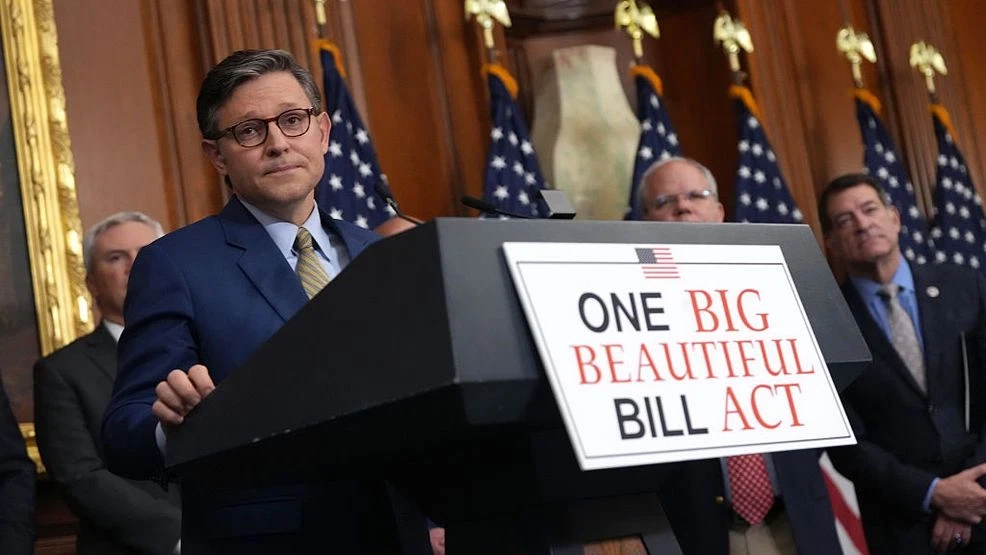
Crossroads at Capitol Hill: The ‘One Big Beautiful Bill’ and a GOP Identity Crisis.
Posted in :
Trump’s “One Big Beautiful Bill” has sparked a civil war inside the GOP, pitting fiscal conservatives against MAGA populists. With over $1 trillion in deficit spending, deep Medicaid cuts, and massive tax breaks for the wealthy, Republicans face a reckoning over what their party truly stands for ahead of the July 4 vote.
The looming passage of the ‘One Big Beautiful Bill’ has fractured the GOP, pitting traditional fiscal conservatives against Trump loyalists. With accusations of fiscal recklessness and spiraling deficits, this bill exemplifies a broader debate about the Republican Party’s future: will it return to budget discipline, or embrace the economic populism of Trump?
It all started with a Fourth of July barbecue—not in D.C., but at a neighbor’s backyard in Texas, where the only thing hotter than the grill was the argument about government spending. Someone cracked a joke about the ‘One Big Beautiful Bill’—’Should we call it the Big, Bad Bankruptcy Bill instead?’—and laughter rippled around the table, but it got me thinking: what actually happens when a party ignores its old rules and writes a trillion-dollar check instead? The answer isn’t just in the numbers; it’s in the soul-searching that follows. Today, we’re witnessing that soul-searching on Capitol Hill, as the GOP finds itself on the brink of an identity crisis over Trump’s latest mega-legislation.
A Fractured Party: ‘Fiscally Criminal’ or Just Politics as Usual?
The Republican Party is facing a moment of raw, public division over the so-called One Big Beautiful Bill. What was supposed to be a unifying, legacy-defining piece of legislation for President Trump has instead exposed a deep rift over deficit spending, fiscal responsibility, and the very soul of the GOP. The fireworks aren’t just coming from Democrats—some of the harshest criticism is coming from inside the party itself.
Rep. Keith Self’s Blistering Rebuke
It was Texas Republican Rep. Keith Self who put it bluntly, calling the Senate’s version of the bill “fiscally criminal.” On X, Self didn’t mince words:
“The House was clear: no new deficit spending. The Senate isn’t listening—their version adds over $1T to the deficit… This isn’t just reckless—it’s fiscally criminal.” — Rep. Keith Self (R-TX)
Self’s frustration isn’t just about numbers on a spreadsheet. It’s about trust, party values, and whether Republicans are still the party of fiscal responsibility—or if that’s just a talking point from a bygone era.
Freedom Caucus Sounds the Alarm
Backing Self’s critique, the House Freedom Caucus issued a stark warning: the Senate’s draft of the One Big Beautiful Bill would add $651 billion to the deficit before interest, and well over $1 trillion once interest is included. That’s not just a rounding error. It’s a direct contradiction of the House budget framework, which called for no new deficit spending.
Their statement was clear—and pointed:
“That’s not fiscal responsibility. It’s not what we agreed to. The Senate must make major changes and should at least be in the ballpark of compliance with the agreed upon House budget framework. Republicans must do better.”
This isn’t just about the math. It’s about whether the party will stick to its promises or cave to political pressure.
Unlikely Allies: Moderates and Conservatives Push Back
What’s striking is that opposition isn’t coming from just one corner of the party. According to The Hill, at least six House Republicans—spanning both moderates and staunch conservatives—are already planning to vote against the Senate’s version. That’s a rare moment of unity among factions that usually can’t agree on lunch, let alone major legislation.
- Moderates worry about the optics and impact of deep Medicaid cuts and tax breaks for the wealthy.
- Fiscal hawks see the ballooning deficit as a betrayal of core Republican values.
- Both sides agree: this isn’t what voters were promised.
The result? A brewing GOP civil war over the future of the party and its approach to spending.
Deficit Spending vs. Party Identity
The numbers are eye-popping: $651 billion in new deficit spending before interest, and more than $1 trillion after. For a party that once prided itself on fiscal restraint, these figures are hard to swallow. Research shows that this internal opposition is more than just a policy dispute—it’s a sign of a larger identity crisis rooted in fiscal policy.
The Trump Tax Cuts and other provisions in the bill are being marketed as pro-growth and pro-worker. But critics argue that the real beneficiaries are big business and wealthy donors, while the working class is left holding the bag. The Freedom Caucus and others warn that ignoring the House’s budget framework isn’t just bad policy—it’s a dangerous precedent.
More Than Numbers: The Future of Republican Values
At its core, this fight isn’t just about the One Big Beautiful Bill or even the deficit. It’s about what the Republican Party stands for. Is it still the party of fiscal responsibility? Or has it become a vessel for populist spending, willing to ignore deficits for short-term political wins?
As the July 4 deadline approaches, the GOP’s internal battle over this bill is a vivid reminder: the party is at a crossroads, and the path it chooses now could shape its identity for years to come.
Beneath the Surface: The Bill’s Hidden Costs and Political Calculations
The “One Big Beautiful Bill” is making headlines for what it promises on the surface—tax cuts, border security, and a bigger child tax credit. But dig a little deeper, and the real story is about who wins, who loses, and what it means for the Republican Party’s soul. The bill’s mix of tax exemption extension, qualified business income deduction tweaks, and estate and gift tax exemption increases is sparking a fierce debate inside the GOP—and it’s not just about numbers on a spreadsheet.
Corporate Tax Cuts and Tax Exemption Extensions: Who Really Wins?
Let’s start with the headline grabbers. The bill delivers what’s being called the largest tax cut in American history, making the Trump Tax Cuts permanent and extending the estate and gift tax exemption to $15 million for singles and $30 million for married couples by 2026, indexed for inflation. There’s also a fresh round of corporate tax breaks and changes to qualified business income deduction rules, supposedly to help small businesses, but critics say the real winners are big donors and business elites.
Research shows that these provisions could tilt the benefits heavily toward the top, while the costs are spread across the rest of the country. The House Freedom Caucus has been blunt: “That’s not fiscal responsibility. It’s not what we agreed to. The Senate must make major changes… Republicans must do better.”
Medicaid Rollbacks Versus Donor-Friendly Provisions—Populism or Payback?
Here’s where the bill’s populist messaging starts to unravel. While the bill touts Medicaid protection for Americans “who truly need it,” it also rolls back coverage for millions, including new work requirements that could see 1.4 million illegal immigrants lose benefits. At the same time, the bill hands out generous tax breaks to corporations and the wealthy.
Is this about helping working families, or is it payback for political donors? Even some Republicans are asking hard questions. The optics are tough: imagine a family of four losing Medicaid coverage just as Wall Street celebrates another windfall from the tax exemption extension. That’s a hard sell, especially with moderates and swing voters.
Senate Amendments: Medicaid, Taxes, and Controversial Priorities
The Senate’s marathon amendment process has put these issues front and center. Lawmakers are haggling over everything from Medicaid cuts to tax changes, with each side trying to shape the bill’s final form. Some amendments aim to soften the blow for vulnerable Americans, while others double down on business-friendly provisions.
The debate is about more than just dollars and cents. It’s about fairness, priorities, and the future of the safety net. Critics warn that slashing healthcare while boosting tax breaks for the wealthy could backfire politically, especially in districts where Medicaid is a lifeline.
Wild Card: The Optics of Medicaid Cuts in a Booming Market
Let’s get real for a second. Picture this: a family of four, already struggling to make ends meet, finds out they’re losing Medicaid coverage. Meanwhile, Wall Street is booming, and the biggest beneficiaries of the largest tax cut are popping champagne. That’s not just bad optics—it’s a political landmine.
A House staffer captured the mood perfectly:
“We’re supposed to be the adults in the room. Instead, this looks like a frat party funded by borrowed money—and the working class is stuck with the bill.”
That’s the kind of soundbite that sticks, especially with voters who feel left behind.
Who Benefits? Who Pays?
- Tax exemption extension to $15M (single) and $30M (married) in 2026, indexed for inflation
- 1.4 million illegal immigrants expected to lose benefits under new work requirements
- Child tax credit increased to $2,500 per family
On paper, the bill claims to protect Medicaid for those who “truly need it,” but in practice, the cuts and new requirements mean fewer people qualify. Meanwhile, the qualified business income deduction and estate and gift tax exemption changes are a windfall for the wealthy.
Studies indicate that these moves could undermine support among moderates, who see the bill as prioritizing business interests over families. The tension between stated populist goals and the real-world effects is fueling a GOP identity crisis—and the debate is only getting louder.
Redefining Conservatism: Populism, Principle, or Political Expediency?
The Republican Party is facing a moment that feels less like a crossroads and more like a head-on collision. At the center of the chaos sits the One Big Beautiful Bill, a sweeping piece of legislation championed by President Trump and his allies. It promises everything from permanent Trump Tax Cuts to historic national security funding and border security investment. But beneath the glossy headlines, a fierce debate is raging—one that cuts to the heart of what it means to be a conservative in America today.
Is Trump’s economic nationalism a bold new strategy, or is it just fiscal roulette with the nation’s future? That’s the question many Republicans are now asking, especially as the bill’s price tag becomes impossible to ignore. The Senate’s version, according to critics like Rep. Keith Self (R-TX), would add over $1 trillion to the deficit. Self didn’t mince words, calling the move “fiscally criminal” and accusing his own party of abandoning its commitment to fiscal responsibility.
This isn’t just a technical squabble over numbers. It’s a fundamental fight over the soul of the GOP. For decades, Republicans have prided themselves on being the party of balanced budgets and limited government. Now, with the One Big Beautiful Bill on the table, that legacy is being challenged by a new wave of populist, big-spending nationalism.
Let’s break it down: The bill funds 10,000 new ICE personnel, 5,000 customs officers, and 3,000 Border Patrol agents—an unprecedented border security investment. It pours money into military modernization, including the Golden Dome missile defense system, all under the banner of national security funding. Supporters argue these investments are essential for American safety and sovereignty. The bill’s summary even claims it’s paid for by increased visa fees, with “no pork spending.”
But traditional deficit hawks aren’t buying it. They see a party willing to mortgage the future for short-term political wins. Medicaid cuts and corporate tax breaks, they warn, could leave working families exposed while the national debt balloons. As one House staffer put it, “Instead, this looks like a frat party funded by borrowed money—and the working class is stuck with the bill.”
It’s hard not to wonder: If Reagan’s speechwriters time-traveled to Capitol Hill today, would they even recognize the party? The old guard’s focus on fiscal responsibility seems almost quaint compared to the current climate, where populist rhetoric often trumps budget discipline. The GOP’s identity crisis is no longer hypothetical—it’s playing out in real time, with moderates and conservatives openly rebelling against the Senate’s version of the bill.
Research shows that this split isn’t just about numbers. It’s about the future direction of the party. Some Republicans believe that prioritizing security spending and economic growth—even at the cost of higher deficits—is the only way to win over working-class voters and keep America strong. Others argue that abandoning fiscal restraint will destroy the party’s credibility and, ultimately, its ability to govern.
As the July 4 deadline looms, the tension is palpable. Will a new wave of fiscal conservative defiance wash over MAGA populism, or will the party double down on Trump’s brand of economic nationalism? The answer could define the GOP for a generation.
“This isn’t just a political fight—it’s a reckoning.”
In the end, the One Big Beautiful Bill is more than just legislation. It’s a test of what the Republican Party stands for—and who it’s willing to leave behind. As Americans watch this drama unfold, one question hangs in the air: Is the GOP still the party of principle, or has political expediency become the new conservative creed?
TL;DR: The ‘One Big Beautiful Bill’ has ignited a passionate debate inside the Republican Party, spotlighting tensions between fiscal conservatism and Trump-style populism. As July 4 approaches, the GOP faces a defining moment—will it stick with financial restraint, or rewrite its playbook?
OneBigBeautifulBill, TrumpTaxCuts, LargestTaxCut, BorderSecurityInvestment, MedicaidProtection, TaxExemptionExtension, EstateAndGiftTaxExemption, QualifiedBusinessIncomeDeduction, WageAndInvestmentLimitation, NationalSecurityFunding,Trump BigBeautifulBill, MedicaidcutsGOP, Republicancivilwar, corporatetaxgiveaways
#OneBigBeautifulBill, #TaxCuts, #GOPDebate, #FiscalResponsibility, #TrumpEra, #DeficitSpending, #PoliticalReckoning, #MedicaidProtection,#GOPIdentityCrisis, #BigBeautifulBill, #MedicaidCuts, #DeficitSpending, #CorporateTaxBreaks

